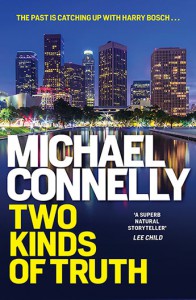

...he had never planted evidence against any suspect or adversary in his life. And this knowledge gave Bosch an affirming jolt of adrenaline and purpose. He knew there were two kinds of truth in this world. The truth that was the unalterable bedrock of one’s life and mission. And the other, malleable truth of politicians, charlatans, corrupt lawyers, and their clients, bent and molded to serve whatever purpose was at hand.
Harry Bosch continues to work as a volunteer San Fernando cold case detective until a very hot case comes in -- a murder. Harry steps in to guide the full-time detectives through this investigation at a family-owned pharmacy. Quickly, they determine that there's a tie between this killing and a criminal enterprise involving prescription drugs (opioids, to be specific). Soon, Harry's doing something he's never really done before to find some answers and hopefully bring the killers to justice. It's a great setup to a story. There's a blast from Harry's past involved in the prescription drug side of the investigation, and I never thought I'd see this character again. It was a nice surprise.
That's not only blast from the past in this novel. An old case of Harry's is being re-opened (by "old" I mean pre-Black Echo, I think) -- supposedly some new evidence has come to light exonerating the man Harry and his old partner arrested. Harry's last LAPD partner, Lucia Soto, is one of the detectives being used by the DA in the re-opening of the case -- but that doesn't mean Harry's getting much of a break. The position of the LAPD and the DA's office is that Harry and his partner put away the wrong man -- framed an innocent man -- and it's just a matter of time until he's released and Harry will be sued for his role. Harry does the smart thing right away and gets Mickey Haller involved, he's going to need legal help -- and emotional support -- to get through this.
The resolution to the Drugs/Murder story was a bit too easy, a bit too rushed for my taste -- which is a shame, because I thought there was a lot more that Connelly could've done with it, and I was really enjoying it. That said, other than the resolution to it -- I thought it was a great story, and if it even skews toward the truth when it comes to how these pills are procured/distributed, it's one of the more disturbing stories that Connelly has ever told.
On the other hand, the resolution of the False Conviction story was never in doubt -- Connelly's not going to do that to Harry. The only question was how he was going to be cleared/how the murderer was going to be proven guilty again. The way it involved the work of Harry, Cisco, and Mickey together -- especially with some wily moves on Mickey's part was a whole lot of fun. I do think Harry's reaction to his half-brother's craftiness reeked of hypocrisy -- he's not above some of the same kind of moves (just not in a courtroom). The difference laying (in Harry's eyes) in that he's a cop, seeking justice and that Mickey's a lawyer, seeking a win. Honestly, that reaction annoyed me a lot -- which is one of the best parts of this series, I frequently am annoyed by Harry Bosch -- he's arrogant, hypocritical, and blind to his own faults. In other words, he's human. He's also dedicated, determined and generally honorable -- qualities you can't help but admire.
I know that this novel is one of the books that's going to be the basis of the next season of Amazon's Bosch, and I couldn't help wondering throughout -- how? Both storylines depend on an older Bosch than Welliver (the wrongful conviction story less-so), and one of them involves Mickey Haller, and I don't see how they could use that character (but it could be done without him, if necessary). There are probably umpteen articles easily found online about how they'll do it, but I'll just wait to watch it. Still, the thought nagged at me throughout reading.
This is typical Connelly/Bosch -- a strong, well=constructed story with compelling characters, a good pace and some twists that you won't see coming. If this was written by anyone else, I'd have likely given it more stars. Maybe that's wrong of me, but . . . something tells me Connelly will be fine no matter what I say. It's a strong book, it's an entertaining book -- there's a lot of good moments, but it could've been better.

 1
1





